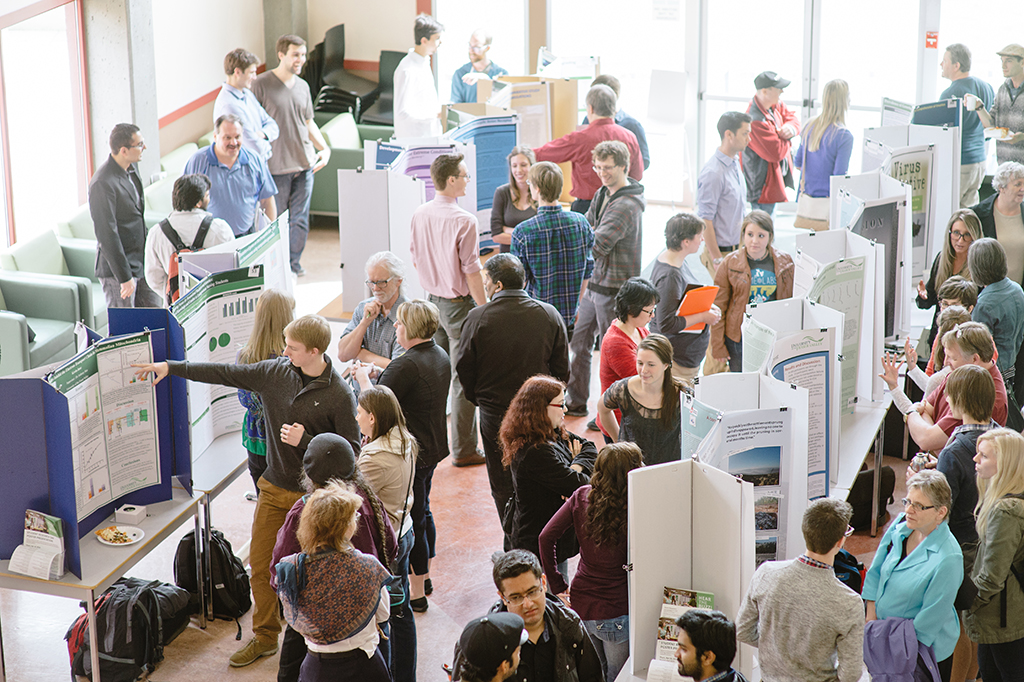
Faculties cite barriers to participation in Undergraduate Research Symposium
By Daniel Huss, November 9 2017 —
The Students’ Union received 140 abstract submissions for the 11th Undergraduate Research Symposium (URS), which will take place on Nov. 30. The URS is the only event of its kind intended for all undergraduate students from every faculty. It showcases research done by undergraduate students of all experience levels. However, the number of applications vary across different faculties.
Abstract submissions from applicants are evaluated for acceptance by an SU Working Group, which is composed of the SU vice-president academic as chair, six student-at-larges and two SU elected officials. At the event, three judges evaluate participants’ work and submit feedback to the Working Group, who then decide on award winners.
The Cumming School of Medicine and the Faculty of Science had the largest number of submissions with 57 and 49, respectively. The Faculty of Arts had 12 applications, Kinesiology had eight, Social Work had three, and Werklund School of Education had two. The Faculties of Nursing and Law each had one applicant. There were no applicants from the Faculty of Veterinary Medicine or the Haskayne School of Business.
SU vice-president academic Tina Miller said the numbers are in line with previous years the symposium has been hosted.
“It’s very consistent with what we’ve seen with smaller faculties,” she said. “We consistently get a lower number from professional faculties and from Haskayne.”
Miller added that she thinks a traditional view of research also contributes to lower numbers of applications from certain faculties.
“I think the numbers in those faculties are consistently lower for this event purely because research is traditionally thought of as something that is done in science,” she said. “I think it’s challenging to get the outreach to those faculties that have less of an emphasis and focus on research as a whole, regardless of whether students are actually performing research in those faculties.”
Each of the faculties with lower submission numbers indicate different barriers to their students participating in the URS.
Faculty of Arts associate dean of teaching, learning and student engagement Dawn Johnston said the format of the URS — which is posters-only — does not accommodate much of the research undertaken by many arts students, especially those in fine arts.
“Much of [research in arts] is very theoretical and critical, requiring a significant amount of background and context or relies on qualitative research methods, which are less easily translated into graphs, diagrams and the other visuals used most typically in scientific research presentations,” Johnston said.
Werklund School of Education associate dean of undergraduate programs Dianne Gereluk said the biggest barrier for education students is the timing of URS.
“Unfortunately, the timing of this particular event is problematic for our first-year education students, because when the call is made they are out in their field experience practicum,” Gereluk said. “For our final-year education students, they’re in the schools already from the beginning of November until the holiday break.”
According to Faculty of Social Work associate dean Christine Walsh, it’s hard for social work students to participate in the URS since students’ only join the faculty for their third and fourth years of study.
“To orient them to the discipline, the profession, to research and get them involved in things like the symposium, it’s a relatively complex and fast job,” Walsh said. “It’s also the timing. Students who are just coming in their third year don’t really have the opportunity.”
Haskayne School of Business associate dean Sherry Weaver said that their students have been rejected from the URS in the past because of the nature of the research they are conducting.
“Generally, our research is very problem-focused and less about the traditional methodologies where one would state a hypothesis and having control groups and being able to do a lot of that measurement,” Weaver said. “A lot of times, it’s a single business and it’s solving problems.”
Weaver says that the 2018 launch of the honours bachelor of commerce program might change the level of participation among Haskayne students.
“Even though you don’t see that many applications this year, I imagine that a couple years from now we will see a rather large contingent of Haskayne students that are going to be participating,” she said.
In response to criticism of a lack of research experience required for the Working Group members, Miller had said that she is looking to set up focus groups in the winter semester with both participants and members of the Working Group Committee to review the event. She added that she will also look at promotional strategies.
“I want to look at whether the outreach that we do and if who we’re promoting the event to correlates to our applications from different faculties,” she said. “I want to see if we’re promoting less to faculties with less submissions. I think it comes down to faculty representatives to promote the URS on our behalf.”
The URS will take place Thursday, Nov. 30 in MacHall from 11 a.m.–2 p.m. and is open to all students.
